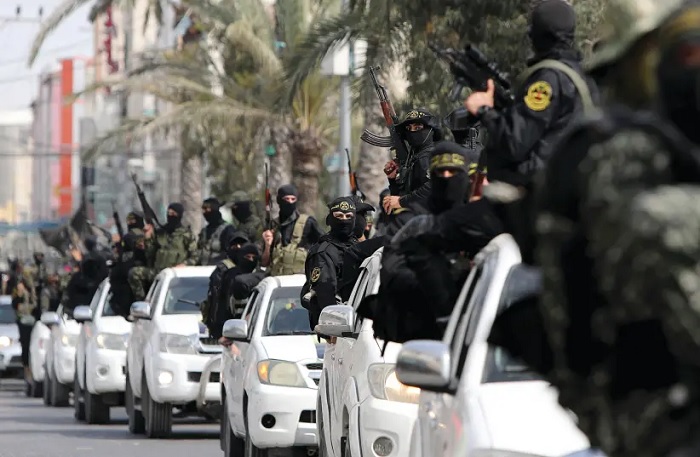
The Palestinian Islamic Jihad terrorist movement announced a general call-up of its forces on Saturday night, citing the deterioration in the condition of Maher al-Akhras, a PIJ operative hunger striking in Israel as the reason.
Akhras has been engaged in a hunger strike for about 90 days. The Palestinian detainee is being treated at Kaplan Medical Center in Rehovot. Both the PIJ and Hamas have threatened confrontation with Israel if his situation becomes dire or he dies.
The PIJ statement on the call-up was originally published on the website of the movement’s military wing, the Al-Quds Brigades, but was subsequently erased and then republished a few hours later as a “statement from a senior official source in the Al-Quds Brigades to Al-Quds Al-Youm TV.”
The terrorist group did not clarify why the original message was deleted and then replaced by a citation of a TV report.
Michael Link, the UN High Commissioner for Human Rights in the Occupied Territories, called on Israel Saturday to release Akhras.
“Recent visits by doctors to his hospital bed in Israel indicate that he is on the verge of suffering major organ failure, and some damage might be permanent,” said Link, according to the Palestinian WAFA news agency.
Akhras’s family announced on Saturday that they would begin a hunger strike as well in support of him.
“More than 85 days into the hunger strike, we are concerned about potentially irreversible health consequences,” said Yves Giebens, head of the International Committee of the Red Cross’ health department in Israel and the PA, according to Al-Jazeera.
“From a medical perspective, he is entering a critical phase,” stressed Giebens.
Akhras has been in administrative detention for months. He denies being a member of PIJ and has been arrested multiple times in the past, according to WAFA.
Israel has said that Akhras is a member of Islamic Jihad who poses a danger to the state, though it was unclear if the accusation was related to carrying out actual violence or some kind of recruiting or incitement relating to the group.
The IDF referred the issue to the Shin Bet (Israel Security Agency), which clarified that at least in the past he had been directly involved in terror and had been arrested five previous times. The Shin Bet declined to give more specifics about his current round of detention.
ADMINISTRATIVE DETENTION is a special status in Israel where a detainee gets to argue for their release in a judicial proceeding, but the standards of the proceeding do not offer the same protections as regular criminal trials.
Due to some evidence against administrative detainees being based on classified intelligence, their defense lawyers often complain that they cannot properly defend their clients since only the court gets to view the full evidentiary file.
Administrative detention was first enacted into law in Defense Regulations by the British Mandate in 1945 to combat Arab and Jewish riots and rebellions in the area. The regulations included curfews, censorship measures, restriction of movement measures and deportation measures.
During the British Mandate, the regulations largely targeted Jews. Jewish residents of the Mandate and visitors were appalled by them. Richard Crossman, a visiting member of the Anglo-American Committee of Inquiry in early 1946, stated that there “can be no doubt that Palestine today is a police state,” according to Prof. Alan Dowty, former president of the Association for Israel Studies.
The Knesset discussed getting rid of the Defense Regulations in 1951, but failed to do so. During the discussions, then-opposition leader Menachem Begin rallied against them, saying “The law that you used is Nazi, it is tyrannical, it is immoral; and an immoral law is also an illegal law.”
“If these laws – terror laws of a repressive regime – remain in the State of Israel, the day will come when no group will remain unharmed by them,” stressed Begin.
